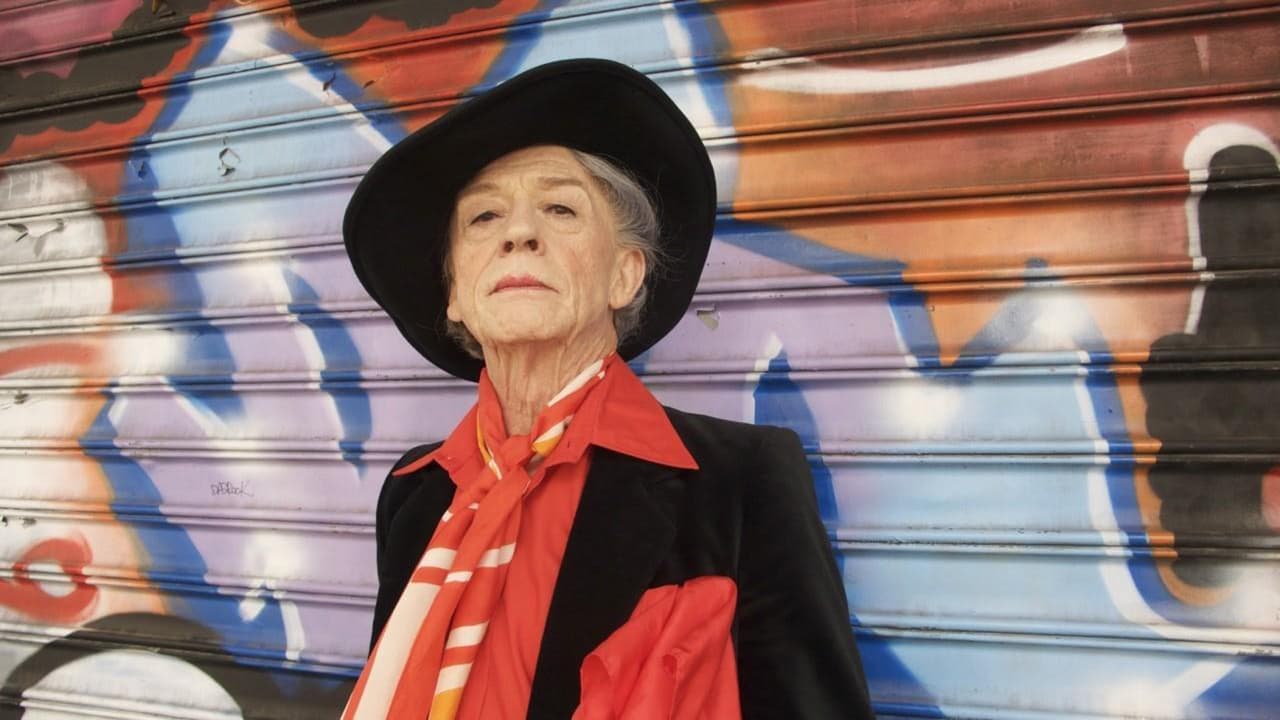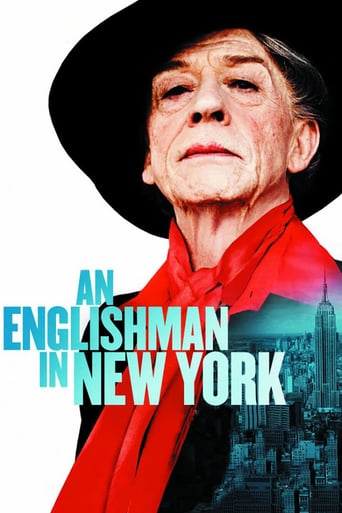NekoHomey
Purely Joyful Movie!
Ogosmith
Each character in this movie — down to the smallest one — is an individual rather than a type, prone to spontaneous changes of mood and sometimes amusing outbursts of pettiness or ill humor.
Marva
It is an exhilarating, distressing, funny and profound film, with one of the more memorable film scores in years,
Wyatt
There's no way I can possibly love it entirely but I just think its ridiculously bad, but enjoyable at the same time.
gradyharp
AN ENGLISHMAN IN NEW YORK is a exceptionally well done film about the last years of the infamous Quentin Crisp (born Denis Charles Pratt, 25 December 1908 - 21 November 1999), an English writer and raconteur - one who is skilled at regurgitating funny anecdotes he heard someone else say first. Writer Brian Fillis has provided a highly polished script for director Richard Laxton, the two thus being able to bring to life this icon of homosexuality in the 1970s who, after publication of his memoir, The Naked Civil Servant, came to America to do 'speaking engagements', better described as cabaret comedy/philosophy routines. He dressed effeminately because that is the way he saw himself, and he adapted to life in New York with a joy that made people notice and respect him finally. John Hurt brings a brilliant luster to his role as the strange but lovely elderly Crisp who sits before audiences and says what comes to his mind. He is befriended by Christopher Street editor Phillip Steel (Dennis O'Hare) who gives him work as a movie critic, noticed by promoter Connie Clausen (Swoosie Kurtz) who schedules him heavily in nightclubs as an act, shy painter Patrick Angus (Jonathan Tucker) whom he champions among galleries, and kooky performance artist Penny Arcade (Cynthia Nixon). At the height of his popularity he makes a comments about AIDS being a 'fad', something that unites gays with a disease that Crisp claims is just what the straight public wants, and his popularity among his audience wanes. He discovers Angus is stricken with the disease and mourns his too soon death, and is sheltered by Steel as he grows into a fragile very elderly 91 year old. Throughout the film Hurt glows as the strange but somehow lovable Crisp, showing us all a side of a man who has been too often dismissed as a weird one. This is a very tender film, complemented by a first class cast, and one that deserves very wide attention. Grady Harp
Gordon-11
This film is about Quentin Crisp's journey in New York and his new found celebrity status as a talk show host at the age of 70's."An Englishman in New York" continues the story that was left off 30 years ago. This time, Quentin Crisp becomes largely irrelevant in the gay community. Yet, he is embraced by the general public with his witty comments and humour. He fiercely tries to be himself in a different culture and a different era, but unfortunately things simply changed. What I get from the film is that he becomes irrelevant and out of touch with the modern day context. "An Englishman in New York" provides a sad portrait of his later life, and is a sharp contrast to what he used to be and what he represented.
ginda2000
This is a fascinating film on so many levels, but most notably (from a production point of view) because Hurt is reprising a role he played 35 years previously as a much younger actor. What makes the piece even more perfect is it picks up where the other film (The Naked Civil Servant) left off.Quentin Crisp – the one time naked life model and civil servant has gained celebrity due to his ITV film 'The Naked Civil Servant'. He is given the opportunity to fly to New York for one month to give talks; however once he arrives in the big apple he falls in love with a city which seems to offer him everything he ever dreamed of. Quentin quickly gains residency as 'a legal alien'. However, he faces some hard lessons about the vastly changing face of not only public homosexuality but also the world in general.My opinion of an Englishman in New York is it's a flawless piece of work. It's rare a film can deliver such a sharp, but honest message which is relevant to today's society. In the original 1975 piece, Quentin was abused and attacked by 'hetrosexual' society not only for being gay but being different. In an Englishman in New York everything has flipped. The heterosexual world seems (on the whole) to adore him and be accepting of his eccentric and overtly homosexual persona. However, now his victimisation comes from the gay community who are excluding their own if they do not fit the very strict criteria of what they deem 'attractive'. Once upon a time Quentin was celebrated in the gay community as a brave pioneer of human rights. Now he's seen as a ghastly old queen who represents every gay stereotype a homosexual man is fighting against.Hurt plays Crisps exasperation to this new rejection with perfect understated brilliance. It becomes very apparent that Quentin was fighting the cause for individuality and the colonisation of the gay community was not actually what he wanted. He seemed to long for a world where every individual was accepted on their own merits and not because they fit criteria of a certain group. WHen Quentin discovers the (seemingly) universal ambition of gay man is to be a caricatured clone of the male heterosexual stereotype – you can almost hear his eyes rolling. It's also saddening to watch the world speed by Crisp in fifth gear, as he tries to get his head around the aggressive "fad" that is AIDS. This lesson being a particularly poignant one he has to learn.Even after seeing 'The Naked Civil Servant' (20 years ago) I had always seen Quentin Crisp as representative of tolerance toward homosexuals. After seeing 'An Englishman in New York' I now see him as someone far more important. Crisp represents tolerance toward individuality and our right to be whoever we want to be without fear of exclusion. As the song says "If Manners maketh man as someone said, Then he's the hero of the day, It takes a man to suffer ignorance and smile Be yourself no matter what they say".
borrelli
Saw this film at the Tribeca Film Festival in NYC and was deeply impressed. A loving, yet honest, look at Quentin Crisp in his later years in New York. John Hurt just IS Quentin Crisp in this role. It's amazing how accustomed we can be to bad acting as a norm until you see a performance like this and are suddenly reminded of how it's really done. Supporting cast is equally effective (how can they not be when you've got Cynthia Nixon and Swoosie Kurtz) with a massive standout being Denis O'Hare. Beautiful understated effective performance. More than simply biographical, it offers many social subjects for consideration in context - queer-on-queer prejudice, appropriate responses to AIDS in the 1980's, and much much more. It's a really good film, and well worth seeking out for just the acting alone. John Hurt is just perfect.

